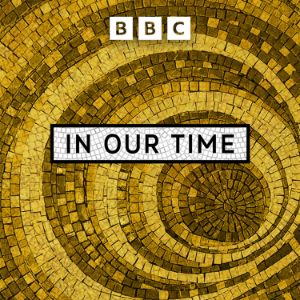
In Our Time
BBC
Spanning history, religion, culture, science and philosophy, In Our Time from BBC Radio 4 is essential listening for the intellectually curious. In each episode, host Misha Glenny and expert guests explore the characters, events and discoveries that have shaped our world. History fans can learn about pivotal wars and societal upheavals, such as the rise and fall of Napoleon, the Sack of Rome in 1527, and the political intrigue of the Russian Revolution. Those fascinated by the lives of kings and queens can journey to Versailles to meet Marie Antoinette and Louis XIV the Sun King, or to Ancient Egypt to meet Cleopatra and Nefertiti. Or perhaps you're looking to explore the history of religion, from Buddhism's early teachings to the Protestant Reformation. If you're interested in the stories behind iconic works of art, music and literature, dive in to discussions on the artistic genius of Michelangelo's Sistine Chapel and Van Gogh's famous Sunflowers. From Gothic architecture to the works of Shakespeare, each episode of In Our Time offers new insight into humanity's cultural achievements. Those looking to enrich their scientific knowledge can hear episodes on black holes, the Periodic Table, and classical theories of gravity, motion, evolution and relativity. Learn how the discovery of penicillin revolutionised medicine, and how the death of stars can lead to the formation of new planets. Lovers of philosophy will find episodes on the big issues that define existence, from free will and ethics, to liberty and justice. In what ways did celebrated philosophers such as Mary Wollstonecraft and Karl Marx push forward radical new ideas? How has the concept of karma evolved from the ancient Sanskrit texts of Hinduism to today? What was Plato's concept of an ideal republic, and how did he explore this through the legend of the lost city of Atlantis? In Our Time celebrates the pursuit of knowledge and the enduring power of ideas.
Location:
London, United Kingdom
Genres:
History Podcasts
Networks:
BBC
Description:
Spanning history, religion, culture, science and philosophy, In Our Time from BBC Radio 4 is essential listening for the intellectually curious. In each episode, host Misha Glenny and expert guests explore the characters, events and discoveries that have shaped our world. History fans can learn about pivotal wars and societal upheavals, such as the rise and fall of Napoleon, the Sack of Rome in 1527, and the political intrigue of the Russian Revolution. Those fascinated by the lives of kings and queens can journey to Versailles to meet Marie Antoinette and Louis XIV the Sun King, or to Ancient Egypt to meet Cleopatra and Nefertiti. Or perhaps you're looking to explore the history of religion, from Buddhism's early teachings to the Protestant Reformation. If you're interested in the stories behind iconic works of art, music and literature, dive in to discussions on the artistic genius of Michelangelo's Sistine Chapel and Van Gogh's famous Sunflowers. From Gothic architecture to the works of Shakespeare, each episode of In Our Time offers new insight into humanity's cultural achievements. Those looking to enrich their scientific knowledge can hear episodes on black holes, the Periodic Table, and classical theories of gravity, motion, evolution and relativity. Learn how the discovery of penicillin revolutionised medicine, and how the death of stars can lead to the formation of new planets. Lovers of philosophy will find episodes on the big issues that define existence, from free will and ethics, to liberty and justice. In what ways did celebrated philosophers such as Mary Wollstonecraft and Karl Marx push forward radical new ideas? How has the concept of karma evolved from the ancient Sanskrit texts of Hinduism to today? What was Plato's concept of an ideal republic, and how did he explore this through the legend of the lost city of Atlantis? In Our Time celebrates the pursuit of knowledge and the enduring power of ideas.
Language:
English
While you wait: The Death of Reading (from The Global Story)
Duration:00:27:12
Melvyn Bragg meets Misha Glenny
Duration:00:16:09
Dickens (Archive Episode)
Duration:00:43:40
Emily Dickinson (Archive Episode)
Duration:00:50:14
Shakespeare's Sonnets (Archive Episode)
Duration:00:53:21
Margery Kempe and English Mysticism (Archive Episode)
Duration:00:47:11
Eclipses (Archive Episode)
Duration:00:49:48
Feathered Dinosaurs (Archive Episode)
Duration:00:48:44
Pauli's Exclusion Principle (Archive Episode)
Duration:00:49:09
Zeno's Paradoxes (Archive Episode)
Duration:00:47:14
Thomas Hardy's Poetry (Archive Episode)
Duration:00:50:45
The Moon (Archive Episode)
Duration:00:43:30
The Waltz (Archive Episode)
Duration:00:52:15
Hannah Arendt (Archive Episode)
Duration:00:48:18
The Time Machine (Archive Episode)
Duration:00:52:28
Sir Thomas Wyatt (Archive Episode)
Duration:00:57:50
The Waltz (Archive Episode)
Duration:00:52:04
Julian of Norwich (Archive Episode)
Duration:00:50:01
Pheromones (Archive Episode)
Duration:00:49:08
Tutankhamun (Archive Episode)
Duration:00:53:28
